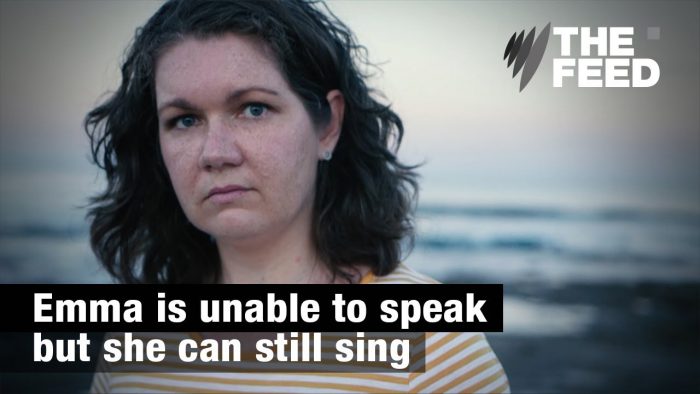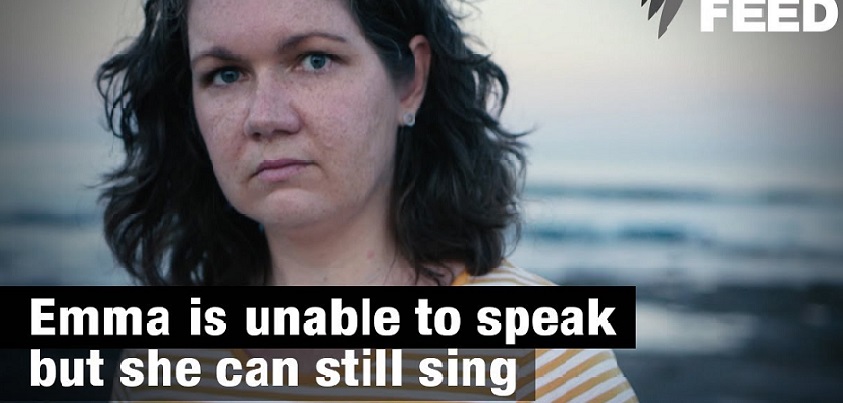33歳のエマさんは脳卒中をおこして、「失語症」と診断されました。言葉を発することが出来ないストレスで、深い孤独を味わい、死をも考えたエマさん。でも、彼女は歌うことで言葉を取り戻しました!今日のYouTubeで学ぶ英語は、歌で生きる力を取り戻した女性のお話です。(※1度再生した後に指定部分から再生する場合は、パソコンのF5ボタンを押すなどして、ページ全体を更新してから動画を再生してください)

YouTubeの「Emma is unable to speak but she can still sing」=The feed チャンネルより
失語症=aphasia とは、脳梗塞や卒中など脳の血管に傷害が起きた後に、大脳(たいていの人は左脳)の中の言葉を受け持っている「言語領域」が損傷を受けて引き起こされる症状です。脳のどこに障害があるかで、症状は異なるそうですが、「話す」ことだけでなく、「聞く」「読む」「書く」ことも難しくなります。「知的な能力も失われた」と誤解されがちですが、そうではないのです。エマさんが脳卒中をおこしたのは33歳の時、オーストラリアの家庭裁判所専門の事務弁護士としてバリバリと活躍していた彼女にとって言葉を失うということは、本当に辛いことでした。
失語症と分かったときのエマさんの気持ちと、両親の話を聴いて、( )の中を書きとって下さい。
- What goes ( 1 ) your mind, Emma, in those moments when you can’t get the words out ? When you’re ( 2 ) to communicate? 言葉が出てこない時、エマさん、どんなことを思っていますか?意志の疎通が出来ない時?
- ★
- Have you felt that… a lot? それ、よく思っているんですか?
- Very ( 3 ). すごく苛立たしいんですね。
- Emma Beasley is 35. エマ・ベイズリーは35歳。
As a lawyer working in the Family Court, she ( 4 ) on her voice to do her job. 家庭裁判所の事務弁護士として、声を頼りにして仕事をしてきました。
- But a stroke left her with partial paralysis
and a rarely talked-about neurological disorder called aphasia. しかし、脳卒中のために、部分麻痺と、「失語症」と呼ばれる神経障害が残ったのです。失語症のことはあまり知られていません。
- She couldn’t talk. She couldn’t find the ( 5 ) words. あの子は話が出来ませんでした。ピッタリの言葉を見つけられなかったのです。
- She recognized ( 6 ) but she couldn’t say our names. あの子は我々のことは認識できるのですが、名前を言うことは出来なかったのです。
★動画の最初の方で、インタビュアーに「言葉が出てこない時、エマさん、どんなことを思っていますか?」ときかれて、文字を書きます。まず Lonely= 孤独と書いた後、Suidicial と書きます。おそらくSuicidal =自暴自棄の、自殺衝動のある、と書きたかったのでしょう。
*partial paralysis 部分麻痺、半身不随
*neurological disorder 神経障害
彼女に起きた「奇跡」の部分を聴いて下さい。今回は、ある程度の長さのある部分を書き取ってみて下さい。
- But ( 7 ) that’s about to turn Emma’s life around. What her parents call “a miracle”. しかし、信じられないことが起きて、エマさんの人生は好転します。彼女のご両親が「奇跡」と呼ぶ出来事です。
- ヒント:単語 3
- One day my husband just said “Let’s put some music on. “You know, she might respond to music.” And all of a sudden the song “I Will Survive” came on. And she started singing it…..and we just looked so stunned, we couldn’t believe.
( 8 ). ある日、夫が言ったんです。「音楽をかけようよ。エマも、もしかしたら音楽に反応するかもしれない」その時、 “I Will Survive” が突然流れてきて、そしたらエマが歌い出したの。私たち、呆然としてしまったわ。その光景が信じられなくて。- ヒント:単語 12
- People with aphasia can often not be able to speak but can still get the words out through singing. It’s really about the various networks in the brain that ( 9 ). 失語症の人たちは、多くの場合話せないわけですが、歌うことで言葉を出すことが出来るんです。これは脳の中のネットワークに関係があって、他の能力をつかさどっている部分と言葉とが関連しているからです。
- ヒント:単語 5
※アイデアニュース有料会員(月額300円)限定部分には、聴き取りの答えと解説、エマさんが初めて、参加者の多くが失語症を持っている人たちだという特別な合唱団と歌ったときの様子などを掲載しています。ぜひご利用ください。ここでクイズです。【1】エマさんが最も歌いたい歌はなんでしょう?【2】エマさんの将来の夢はなんでしょうか? 有料部分に答えを出しておきます。
<有料会員限定部分の小見出し>
■聴き取りの答えと解説
■なぜ話せなくても歌えるのか
■クイズの答え
<関連リンク>
The Feed https://www.sbs.com.au/news/the-feed/
- YouTubeで学ぶ英語:(108)これからもYouTubeで学習を続けてください 2021年12月25日
- YouTubeで学ぶ英語:(107)インドネシア・ジャワ島のスメル火山が噴火 2021年12月11日
- YouTubeで学ぶ英語:(106)性被害告発後の中国テニス選手、真実はどこに 2021年11月27日
※ここから有料会員限定部分です。
■聴き取りの答えと解説
- 1. through *go through (句動詞) 体験する、経る
- 2. stuck *be stuck to ~(句動詞) 詰まる、~に張りつく、
- 3. frustrating (形)苛立たしい、腹立たしい
- 4. relied (動)頼る、当てにする cf. rely on~ ~に頼る 類語:depend on, count on
- 5. right (形)正しい、合っている
- 6. us (代名)目的格 私たちを
- What goes through your mind, Emma, in those moments when you can’t get the words out ?When you’re stuck to communicate?
- Have you felt that… a lot?
- Very frustrating.
- Emma Beasley is 35.
As a lawyer working in the Family Court, she relied on her voice to do her job.- But a stroke left her with partial paralysis and a rarely talked-about neurological disorder called aphasia.
- She couldn’t talk. She couldn’t find the right words.
- She recognized us but she couldn’t say our names.
- 7. something incredible happened 何か信じられないことが起きた
- *incredible という形容詞が、something という代名詞を形容するときは後ろからになります。
- 8. She could sing that song but she couldn’t tell me my name その歌は歌えるのに、私の名前を言うことが出来なかった
- 9. look after those different abilities
- But something incredible happenedthat’s about to turn Emma’s life around.
What her parents call “a miracle”.
- One day my husband just said “Let’s put some music on. “She might respond to music.” And all of a sudden the song ‘I Will Survive’ came on. And she started singing it…..and we just looked so stunned, we couldn’t believe. She could sing that song but she couldn’t tell me my name.
- People with aphasia can often not be able to speak but can still get the words out through singing. It’s really about the various networks in the brain that look after those different abilities.
■なぜ話せなくても歌えるのか
Speech is controlled by the left side of the brain, whereas music is processed by the whole brain mostly in the right hemisphere. 発話は、脳の左側でコントロールされています。一方、音楽はほとんど右脳で、また脳全体でも処理されます。But for someone with aphasia, it’s not as simple as singing what they can’t communicate with speech. 失語症がある人にとって、発話は歌うことほど単純ではありません。When you have a stroke those brain cells have died. 脳卒中をおこすと、その部分の脳細胞は死んでしまいます。They’re lost and that’s why the speech won’t come out. なので、言葉は出てこないわけです。But with music, you’re not trying to use the side of the brain that’s damaged. でも、音楽と一緒なら、損傷を受けた側の脳を使わないのです。Other parts of the brain can take over the function and so they’re really accessing words which we use in songs via the music networks rather than having to go through that channel of language that’s been damaged. 脳の反対側の部分が機能を引継ぐので、彼らは、音楽を処理する脳のネットワークを通して歌に使われている言葉にアクセスします。損傷を受けてしまった言語をつかさどる部分を介さなくてもいいわけです。
Until now, Emma has only been able to sing a handful of songs. 今までのところ、エマさんが歌える歌はほんの少しでした。But today, she’s on her way to join a choir for the first time. でも今日、彼女は初めて合唱団に参加するのです。And it’s no ordinary choir. そして、その合唱団は普通の合唱団ではありません。Many of these singers have aphasia too. 多くの参加者が、失語症をもっているのです。 Welcome to your first choir. 初めての合唱団にようこそ。What do you reckon? どう思いますか?How are you feeling? どんな気分?Nervous. Nervous? 戸惑ってる。ドキドキ?You want to give it a go? やってみますか?Okay.オーケー。
In our choir some can’t speak at all. この合唱団では、まったく話せないという人もいます。Others might have trouble finding the word here or there ピッタリした言葉を探すのが難しいという人もいます。but all of them can be lost for words. でも、みんな、言葉になんらかの障害があるのです。It’s very exciting for people like Emma who can be so frustrated at not being able to use that medium anymore, not be able to get your words out. エマのような、言葉という伝達手段を使えないことに、言葉を発することが出来ないことにものすごく苛立っている人にとって、これはすごくワクワクする体験だと思います。And your words are so connected with who you are, your voice. 言葉は自分自身であり、言葉は声ですよね。It’s very empowering then. 言葉を声で発するということは力を得ることなんです。And sure, it’s singing. もちろんこれは歌なんです。You’re singing songs, it’s not just having a conversation. 歌っているのであって、会話をおこなっているのではありません。But there is research starting to suggest that there can be some carryover into your speech. でも、このことが、発話につながっていく可能性があるという研究も始まっているのです。
■クイズの答え
【1】エマさんが最も歌いたい歌
答え:I will survive
【2】エマさんの将来の夢
答え:Family Court of Australia オーストラリアの家庭裁判所に戻って、元の仕事に戻ること。
では、最後に動画全体をご覧ください。リハビリを続けたエマさんが、元の仕事につける時が来ますように。
